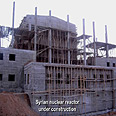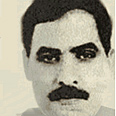

Iranian defector tipped Syrian nuke plans
Swiss daily says retired Revolutionary Guards general Ali Reza Asghari told US Intelligence Tehran was financing secret nuclear project of Syria and North Korea; 'Israelis who were immediately informed also were completely unaware,' according to report, which is denied by Washington
A top-ranked Iranian defector told the United States that Iran was financing North Korean moves to make Syria into a nuclear weapons power, leading to the Israeli air strike that destroyed a secret reactor, a report said Thursday.
The article in the daily Neue Zuercher Zeitung goes into detail about an Iranian connection and fills in gaps about Israel's Sept. 6, 2007, raid that knocked out Syria's nearly completed Al Kabir reactor in the country's eastern desert.
The February 2007 defection to the United States of Ali Reza Asgari, a retired general in Iran's elite Revolutionary Guards and a former deputy defense minister, provided considerable information on Iran's own nuclear program, said the article, written by Hans Ruehle, former chief of the planning staff of the German Defense Ministry.
"The biggest surprise, however, was his assertion that Iran was financing a secret nuclear project of Syria and North Korea," he said. "No one in the American intelligence scene had heard anything of it. And the Israelis who were immediately informed also were completely unaware."
Ruehle, who did not identify the sources of his information, publishes and comments on security and nuclear proliferation in different European newspapers and broadcasts and has held prominent roles in German and NATO institutions.
'Syrians were completely surprised'
US Intelligence had detected North Korean ship deliveries of construction supplies to Syria that started in 2002, and American satellites spotted the construction as early as 2003, but regarded the work as nothing unusual, in part because the Syrians had banned radio and telephones from the site and handled communications solely by messengers - "medieval but effective," Ruehle said.
Intensive investigation followed by US and Israeli intelligence services until Israel sent a 12-man commando unit in two helicopters to the site in August 2007 to take photographs and soil samples, he said. "The analysis was conclusive that it was a North Korean-type reactor," a gas graphite model, Ruehle said.
Other sources have suggested that the reactor might have been large enough to make about one nuclear weapon's worth of plutonium a year.
Just before the Israeli commando raid, a North Korean ship was intercepted en route to Syria with nuclear fuel rods, underscoring the need for fast action, he said. "On the morning of Sept. 6, 2007, seven Israeli F-15 fighter bombers took off to the north. They flew along the Mediterranean coast, brushed past Turkey and pressed on into Syria. Fifty kilometers (30 miles) from their target they fired 22 rockets at the three identified objects inside the Kibar complex.
"The Syrians were completely surprised. By the time their air defense systems were ready, the Israeli planes were well out of range. The mission was successful, the reactor destroyed," Ruehle said.
Israel estimates that Iran had paid North Korea between $1 billion and $2 billion for the project, Ruehle said. Israel has not commented on the strike, but after a delay of several months Washington presented intelligence purporting to show the target was a reactor being built with North Korean help.
Iranian officials were not available for comment because of a national holiday. In general, Iran has been silent about the Syrian facility bombed by Israel. Syrian officials could not be reached for comment. But Syria has denied the facility was a nuclear plant, saying it was an unused military building. It has also denied any nuclear cooperation with North Korea or Iran. The International Atomic Energy Agency earlier this year said UN Inspectors had found processed uranium traces in samples taken from the site.
Syria has suggested the traces came from Israel ordnance used to hit the site, but the IAEA said the composition of the uranium made that unlikely. Israel has denied it was the source of the uranium.
Syria has told diplomats that it built a missile facility over the ruins of the site.
However, a US Counter-proliferation official denied the report, saying "there is strong reason to believe that only two countries were involved in building the Syrian covert nuclear reactor at Al Kibar - Syria and North Korea."















